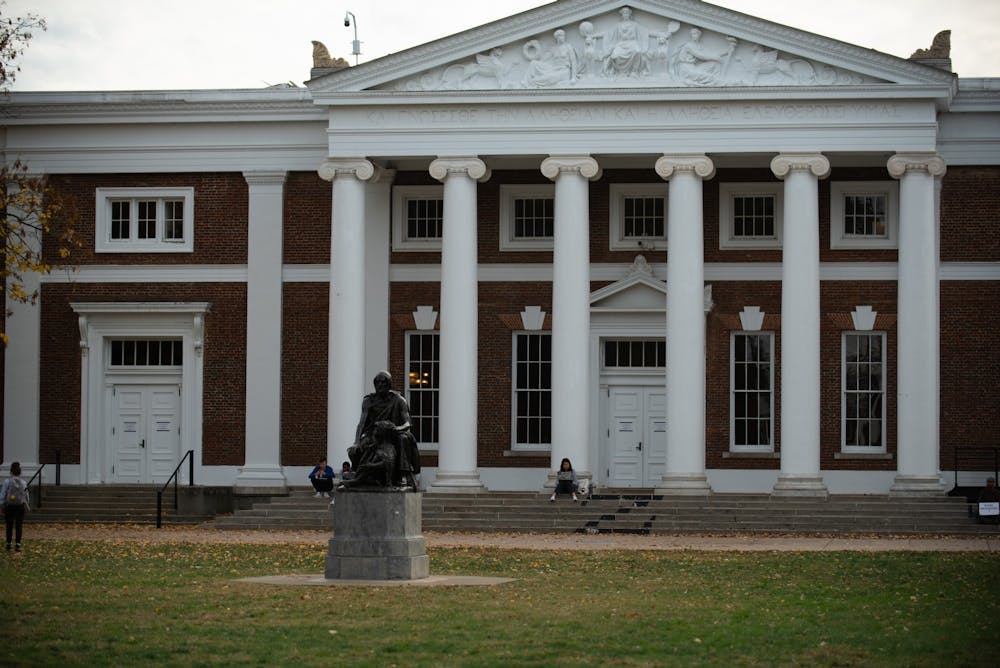Members of the Persian Cultural Society and the Afghan Student Association gathered at the foot of the Homer statue Monday with Iranian flags and handmade signs denouncing the violent subjugation of Iranian women and the violence against ethnic Hazaras in Afghanistan.
Fourth-year College student Zainora Babayee said life at the University cannot exist in isolation from violence in Afghanistan.
“As a student, I cannot focus,” Babayee said. “I can’t focus on my studies because my mind is in Afghanistan, with the people who are dying, with the girls who went to school and got killed.”
Protests have erupted in Afghanistan after a suicide bomber attacked the Kaaj education center in Kabul, killing 25 people and injuring at least 56, most of whom are thought to have been young women. The attack occurred in an area primarily occupied by the Hazara, a Shiite Muslim ethnic group frequently targeted by ISIS and the Taliban.
Many around the world view the continued violence against Hazaras as an act of genocide. The Twitter hashtag #StopHazaraGenocide has been tweeted over 10 million times as of Oct. 15. Despite the Taliban’s ban on protests after retaking power, Afghani women have risked their lives to protest the Taliban’s violent and repressive regime.
In contrast to these outspoken acts, Babayee condemned what she feels has been a lack of response from the University’s to the continued violence and female subjugation in Afghanistan.
“When it was the war in Ukraine, everyone — and even my professor came — and asked us for ways to help Ukraine, but when Afghanistan fell, when girls were banned from schools, nobody talked about it,” Babayee said.
Neighboring Iran has faced intensifying violence in the face of growing political unrest. Protests across Iran continue to swell in response to the death of Mahsa Amini, a Kurdish woman detained by Iranian “morality police” — an Iranian law enforcement agency charged with maintaining its strict female dress codes — Sept. 13 for allegedly not wearing her hijab tightly enough. Amini died Sept. 16 of what the Iranian government claims was a heart failure but many believe to be police brutality.
The subsequent protests have not only pushed against Iran’s compulsory hijab requirements, but also called for the forceful removal of Iran’s supreme leader, Ayatollah Ali Khamenei. Iranian law enforcement has responded with violence, with Norway-based group Iran Human Rights alleging that 215 people have been killed by Iranian security forces as of Monday, at least 27 of whom are children. The Iranian government has also limited internet connection and crackdowns on Iranian university students.
Fourth-year Commerce student Neikey Panah expressed frustration with the repeated failures of the U.S. government’s policies in Iran. Panah described how her mother, a native Iranian, was imprisoned for protesting in the wake of the 1978 Iranian Revolution, losing family and friends alike at the hands of the Iranian government.
“This is a 40 year difference and we’re still seeing the same things happen,” said Panah. “We’re still seeing the U.S. glide over it … there’s an unwillingness to deal with what the Iranian government is doing.”
Various students attending Monday’s protest called on community members to educate themselves on the conflicts in Afghanistan and Iran as well as for the University to make an official statement of solidarity. While University President Jim Ryan made a recent comment on Iran to UVA Today, various protestors deemed it unsatisfactory.
“We are U.Va., we are very strong about speaking our mind, we were made by a man who spoke his mind,” Panah said. “It’s insane to me that we haven’t had a greater statement of solidarity sent to the University like we have for other things going on around the world.”
Neala Loynab, president of the Afghan Student Association and fourth-year College student, similarly called on Ryan to use his platform to spread awareness.
“Use your platform, amplify everyone else’s voice,” Loynab said. “That’s what we’re doing.”







